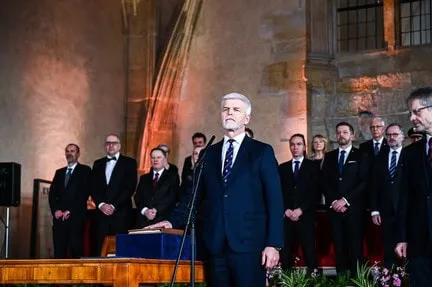Through the Czech Ambassador to Germany, President Pavel greeted the Sudeten Germans at their annual meeting in Augsburg, saying that he was "pleased with the direction and dynamism with which our mutual relations are developing". What did the Czech President mean by 'direction' and 'dynamism'? In Peter Paul's eyes, should relations develop differently from the way they were negotiated and organised in the Czech-German Declaration of 1997, the text of which both signatory countries were satisfied with? Are we even to expect that Pavel wants to correct the Declaration in some way because he finds it "unfair" to the Sudeten Germans? And what to make of the expressed joy at the "dynamics of development"? How far will we be willing to go in relation to the Sudeten Germans under Paul's tact? Are we going to retell history, after all, as is already "successfully" happening? Will we forget everything that happened to the Sudeten Germans? Will this be the "dynamics" and "direction"? I am not about reviving historical wrongs, but we must not so blithely allow the past of this country and the fate of its people to be betrayed. And we certainly shouldn't tolerate it in the President of our country.
Another "remarkable" statement by Petr Pavel is his claim that 16-year-olds should be given the right to vote because "they often have a better overview of the situation in the Czech Republic than their parents" (I prefer to leave without comment his remark that "some adults should not have the right to vote", even though it is a scandalous statement coming from the head of state). Does Petr Pavel really mean this?
What does the more "enlightened" generation really know about the world"? What, in the words of the President, is meant by "an overview of the situation in the Czech Republic"? Do young people (I even want to write children) of this age have any experience with the social or health care system? Have they already paid taxes and do they perceive how the government handles their money? Have they had an obligation to take care of their children or grandparents? What is Paul's criterion for "situational awareness"? The ability to be on a cell phone or computer for five or six hours a day, information we also learned about today's young people from the media a few days ago? None of these are qualifications that should entitle us to lower the voting age to sixteen.
The only motivation for Petr Pavel - and also for politicians like Nerudová, Pekarová Adamová or Fiala - is the repeatedly proven fact that their political "kind" regularly wins in fictitious elections (the organization of which among high school students is a strange folklore before every election) among people under 18, and thus represents for them another set of potential voters (since adults don't want to vote for them much). They should realize, however, that for most sixteen-year-olds, they are winning not because they are so politically impressive, but because most sixteen-year-olds are still treating it all as a game, as another noncommittal extension of virtual reality on their mobile or computer screens, without being obliged to bear the consequences of their choices. After the approval of postal voting, granting the right to vote to 16-year-olds would be another targeted attempt to influence the election results.
Petr Pavel spoke at a conference on the future of the Czech Republic. He again railed against the "incomprehensible hesitation about adopting the European currency", comforted the participants by claiming that "much of our success is due to joining NATO and the EU", and defended the existence of a "digital highway for a modern economy", called for "respect for climate commitments", marveled at the slowness of "transforming our economy into an education and high value-added economy", and called for "a shift from the prevailing teaching of encyclopaedic knowledge to the teaching of creative and critical thinking". The text of Paul's address was full of platitudes, general exclamations, non-specific proclamations and buzzwords. A kind of "Euro-Social" or "perestroika" speech of the type "we will catch up and overtake". It is as if you were listening to a recording of Strougal at one of the Communist Party congresses. Back then it was "the struggle for grain and more steel and cement", today it is digitalization and the mantra of Industry 2.0. The scenery is different, the essence is the same.
Perhaps one could wave one's hand over the words of Petr Pavel (and Fiala, Rakušan, Jurečka, Bartoš, Pekarová Adamová and their "boys and girls") if they did not so aptly characterize the current state of Czech politics - the indulgence in strategies and visions presented by the seditious political posturing.
It's just the serious concern for our country that's missing.
Ivo Strejček
institutv.cz/gnews.cz-JaV_07



